A report of our involvement in flood relief in Bangkok in November 2011
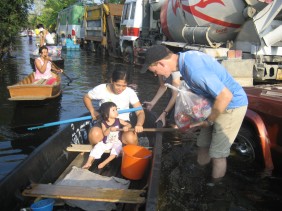
Many of you would have seen and heard of the recent Bangkok floods. My wife, Belinda, and I followed the news day by day and were horrified by the pictures posted on Facebook by friends. Day by day I felt that God was calling me to get involved, but what could I do?
We live in South Thailand, such a long way from Bangkok. Surely the people in Bangkok didn't want us to turn up and be a burden on an already burdened city. Early in November one of our close missionary friends, Marten Visser started posting on Facebook photos and stories about the flood relief he and his co-workers were doing.
"Is there anything we do to help?" my wife, Belinda, asked.
"Yes, come and help us!" was his reply.
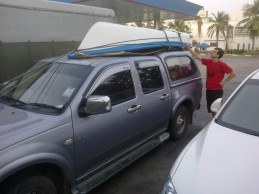
It turns out that he had started receiving donations from his home country, the Netherlands, and needed help to deliver the assistance to the people affected by flooding. I discussed my desire to go and help with the church-planting team here in Pak Phanang (Nakhon Si Thammarat province in South Thailand) and discovered that two other team members, Sue Ambler and Steve McCallum, were having similar thoughts to myself. After a few days of deliberation and preparation, we set off for Bangkok.
One of the first things we discovered was the enormous mountain of false information and rumours that were going around about the situation in Bangkok. "There's hardly any drinking water and food available," and "Buy a boat in South Thailand, because there's none available here," were some of the things we heard. Having suitably equipped ourselves with food, water and a boat, we arrived in Bangkok discovering that only half the city was under water and life was going on as usual in the dry parts of town. There were none of the shortages we had been told about.
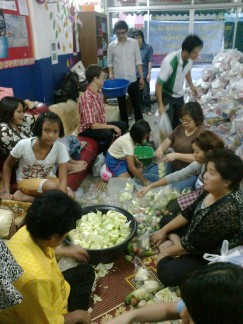
We were put in contact with Bang Mot ACT Church on the western side of the city. This church that had already been receiving donations of vegetables and rice, were cooking meals with these supplies and delivering them into flooded communities. They had just run out of cash and supplies to continue this ministry when we were put in contact with them. Pastor Ponlawat, the pastor of Bang Mot Church, doesn't even have a vehicle and had been begging for assistance from other churches to help deliver this food. All of us marvelled at God's timing of our arrival.
The flood relief assistance arrived within 24 hours of our arrival in Bangkok, in the form of a truck with 430 "care bags". Each bag had rice, dry and tinned foods and cooking oil, as well as other daily necessities such as tissues and toothpaste. With the members of the Bang Mot Church on hand to help unload the truck, the job was done in record time. The bottom floor of the little church was filled with a waist-high pile of God's love, yet to be poured out on the flood-affected peoples of western Bangkok. Over the following week, another 380 bags were to arrive as well.
In the mean-time Pastor Ponlawat spent hours on the phone, talking with churches in flooded communities on the western side of Bangkok in order to find which places had the greatest need, and which churches could help with the distribution. Sunday morning worship over, and more meals made with the final bits of rice and vegetables, we were all ready to head out on Monday morning
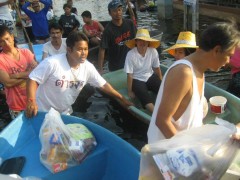
On the morning of Monday, 21st November, we loaded up my pickup and the pickup of one of the church members and went to Bang Khae (look it up on Google Maps) to make our deliveries. That afternoon we went to a community on the other side of the Phetkasem Rd. Tuesday was at Tha Kaset community a little further east, then on Wednesday we were back in the same area, helping a community whose community leader had contacted us the day before. At each place we discovered the same thing. Other charities had been was using army trucks to distribute assistance also. However, the big army trucks couldn't go down the long, narrow laneways and thus stopped at the mouth of each lane to distribute goods. (Some of these lanes, called "sois", were over 2 kilometres long.) Those who lived down the end of the soi were unable to get to the mouth of the soi in time to receive assistance. Those who lived near the main roads often received multiple packages and hoarded them. Thus very quickly we stumbled on an important strategy that we were to follow all that week: to drive as far as possible into these communities and then if the water became too deep, to unload the boats we had, load them up with goods and wade or paddle further into the flooded communities.
The appreciation shown by the recipients of this flood relief was very evident. Many of these people had been out of work for a month (their work places had shut due to the flooding) and some were finding it hard to get just one decent meal per day. At each place we would not make a big deal except to say we were Christians and had brought the bags as God's blessing to the local people.
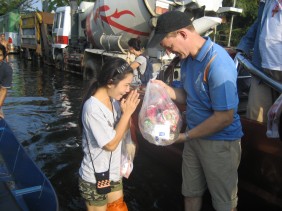
Thursday was our most challenging day. We had decided to travel further to Thawi Watthana (once again, you can look it up on Google Maps), an area that had been inundated with 1.5 metres of water for weeks. The road we had been told to follow was flooded too deeply for our vehicles to pass. We took another road and ended up three kilometres from the local church we were heading to, but once again, the road there had deep water. A local person told us of a back road which was higher. Once again we set off, and after driving through two feet of water (the inside of my pickup became a swimming pool) we made it to our destination. The delight of the local people at our arrival made our difficult journey all worthwhile. Our journey back took a third of the time taken to get there, now that we knew which way to go around the flood waters.
Having learnt the lesson of the previous day, we did a survey trip on Friday morning to help us know the best route to take to get to our chosen destination. That afternoon was a repeat of the previous days, but in an area that made use of the boats necessary. Sadly we discovered that the area had already had care bags delivered by another organisation, but none of the local people had received them. According to the local people we spoke to, one of the local neighbourhood institutions had received all the bags and was storing them away for some unknown reason. Our visit, however, was received with great excitement as we went from house to house distributing our bags.
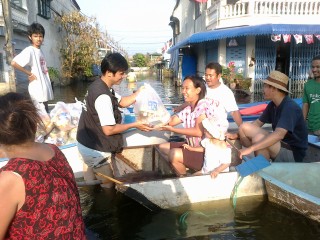
Friday was to be our last day of flood relief work. We planned to return south on the Saturday. However, one more scene of our work was yet to be played out. All throughout that week, people in the flood-affected areas had asked us for drinking water. We knew this was a major issue, and Marten was looking for ways to provide us with a shipment of drinking water. The shipment was delayed, and then delayed again. Finally it arrived much later than expected, at midnight on Friday. Unfortunately, all the team members had returned home by this stage, leaving only the pastor, Steve and myself to unload the 9,000 plus bottles of drinking water! (Sue had already left us the day before to do a scheduled language check in Lopburi.) With no other choice, we unloaded and stacked the bottles in a house next to the church that had been made available to us. Unload, stack, unload, stack...you probably get the picture. By about 2:30 am we had unloaded a bit more than a third of the truck. We were severely discouraged. It was time for serious prayer. HELP LORD!!! Thankfully, God in his kindness sent some help along in the form of two slightly drunk guys we noticed hanging around about 100 metres from the church. They happily got stuck into the work when we asked them to help. We finished unloading the rest of the truck at just after 5 am, allowing all five of us to stumble off into our beds for a few hours.
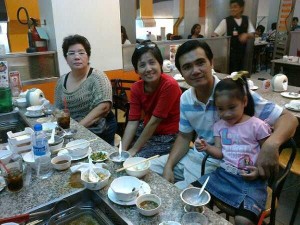
After a wonderful meal with the rest of the church team, Steve and I headed back south with a great sleep-debt but many good memories, and also some new friends to keep in touch with. We'd learnt some valuable lessons as well. The first one of these is that collecting information is just as important as collecting the supplies needed for distribution. The better informed we were, the better we could meaningfully distribute the goods we had. The second lesson was that of flexibility. Our plans changed every few hours. I was very impressed with my co-workers in the way they handled all these changes with aplomb. The third lesson was one of intentional, anticipatory prayer. Every day we met with many situations that could have had serious repercussions towards the team and our equipment. Instead of stressing about these, we covered every known risk and danger with prayer. The Lord didn't let us down.
Looking back I can see that we only played a small part in meeting an enormous need and in this, we were only part of the enormous work being carried out by many different organisations and government agencies. We distributed care bags to somewhere around 800 families, and the goods given out were only a small part of the needs of each of these families. But the real help we gave was much greater than the physical assistance. We were there to give hope. We showed each family that they weren't suffering alone - that somebody really cared for them, and that somebody is God. Most of those communities are dry now, and they begin the task of cleaning up and rebuilding their homes. My prayer is that they will remember the God that cares for them and that doors will be open to the ministry of each local church in each of those communities. Their homes were drowned, but through our care and help, may they truly know the hope of God in their lives.





 We were put in contact with Bang Mot ACT Church on the western side of the city. This church that had already been receiving donations of vegetables and rice, were cooking meals with these supplies and delivering them into flooded communities. They had just run out of cash and supplies to continue this ministry when we were put in contact with them. Pastor Ponlawat, the pastor of Bang Mot Church, doesn't even have a vehicle and had been begging for assistance from other churches to help deliver this food. All of us marvelled at God's timing of our arrival.
We were put in contact with Bang Mot ACT Church on the western side of the city. This church that had already been receiving donations of vegetables and rice, were cooking meals with these supplies and delivering them into flooded communities. They had just run out of cash and supplies to continue this ministry when we were put in contact with them. Pastor Ponlawat, the pastor of Bang Mot Church, doesn't even have a vehicle and had been begging for assistance from other churches to help deliver this food. All of us marvelled at God's timing of our arrival. On the morning of Monday, 21st November, we loaded up my pickup and the pickup of one of the church members and went to Bang Khae (look it up on Google Maps) to make our deliveries. That afternoon we went to a community on the other side of the Phetkasem Rd. Tuesday was at Tha Kaset community a little further east, then on Wednesday we were back in the same area, helping a community whose community leader had contacted us the day before. At each place we discovered the same thing. Other charities had been was using army trucks to distribute assistance also. However, the big army trucks couldn't go down the long, narrow laneways and thus stopped at the mouth of each lane to distribute goods. (Some of these lanes, called "sois", were over 2 kilometres long.) Those who lived down the end of the soi were unable to get to the mouth of the soi in time to receive assistance. Those who lived near the main roads often received multiple packages and hoarded them. Thus very quickly we stumbled on an important strategy that we were to follow all that week: to drive as far as possible into these communities and then if the water became too deep, to unload the boats we had, load them up with goods and wade or paddle further into the flooded communities.
On the morning of Monday, 21st November, we loaded up my pickup and the pickup of one of the church members and went to Bang Khae (look it up on Google Maps) to make our deliveries. That afternoon we went to a community on the other side of the Phetkasem Rd. Tuesday was at Tha Kaset community a little further east, then on Wednesday we were back in the same area, helping a community whose community leader had contacted us the day before. At each place we discovered the same thing. Other charities had been was using army trucks to distribute assistance also. However, the big army trucks couldn't go down the long, narrow laneways and thus stopped at the mouth of each lane to distribute goods. (Some of these lanes, called "sois", were over 2 kilometres long.) Those who lived down the end of the soi were unable to get to the mouth of the soi in time to receive assistance. Those who lived near the main roads often received multiple packages and hoarded them. Thus very quickly we stumbled on an important strategy that we were to follow all that week: to drive as far as possible into these communities and then if the water became too deep, to unload the boats we had, load them up with goods and wade or paddle further into the flooded communities.  Thursday was our most challenging day. We had decided to travel further to Thawi Watthana (once again, you can look it up on Google Maps), an area that had been inundated with 1.5 metres of water for weeks. The road we had been told to follow was flooded too deeply for our vehicles to pass. We took another road and ended up three kilometres from the local church we were heading to, but once again, the road there had deep water. A local person told us of a back road which was higher. Once again we set off, and after driving through two feet of water (the inside of my pickup became a swimming pool) we made it to our destination. The delight of the local people at our arrival made our difficult journey all worthwhile. Our journey back took a third of the time taken to get there, now that we knew which way to go around the flood waters.
Thursday was our most challenging day. We had decided to travel further to Thawi Watthana (once again, you can look it up on Google Maps), an area that had been inundated with 1.5 metres of water for weeks. The road we had been told to follow was flooded too deeply for our vehicles to pass. We took another road and ended up three kilometres from the local church we were heading to, but once again, the road there had deep water. A local person told us of a back road which was higher. Once again we set off, and after driving through two feet of water (the inside of my pickup became a swimming pool) we made it to our destination. The delight of the local people at our arrival made our difficult journey all worthwhile. Our journey back took a third of the time taken to get there, now that we knew which way to go around the flood waters. Friday was to be our last day of flood relief work. We planned to return south on the Saturday. However, one more scene of our work was yet to be played out. All throughout that week, people in the flood-affected areas had asked us for drinking water. We knew this was a major issue, and Marten was looking for ways to provide us with a shipment of drinking water. The shipment was delayed, and then delayed again. Finally it arrived much later than expected, at midnight on Friday. Unfortunately, all the team members had returned home by this stage, leaving only the pastor, Steve and myself to unload the 9,000 plus bottles of drinking water! (Sue had already left us the day before to do a scheduled language check in Lopburi.) With no other choice, we unloaded and stacked the bottles in a house next to the church that had been made available to us. Unload, stack, unload, stack...you probably get the picture. By about 2:30 am we had unloaded a bit more than a third of the truck. We were severely discouraged. It was time for serious prayer. HELP LORD!!! Thankfully, God in his kindness sent some help along in the form of two slightly drunk guys we noticed hanging around about 100 metres from the church. They happily got stuck into the work when we asked them to help. We finished unloading the rest of the truck at just after 5 am, allowing all five of us to stumble off into our beds for a few hours.
Friday was to be our last day of flood relief work. We planned to return south on the Saturday. However, one more scene of our work was yet to be played out. All throughout that week, people in the flood-affected areas had asked us for drinking water. We knew this was a major issue, and Marten was looking for ways to provide us with a shipment of drinking water. The shipment was delayed, and then delayed again. Finally it arrived much later than expected, at midnight on Friday. Unfortunately, all the team members had returned home by this stage, leaving only the pastor, Steve and myself to unload the 9,000 plus bottles of drinking water! (Sue had already left us the day before to do a scheduled language check in Lopburi.) With no other choice, we unloaded and stacked the bottles in a house next to the church that had been made available to us. Unload, stack, unload, stack...you probably get the picture. By about 2:30 am we had unloaded a bit more than a third of the truck. We were severely discouraged. It was time for serious prayer. HELP LORD!!! Thankfully, God in his kindness sent some help along in the form of two slightly drunk guys we noticed hanging around about 100 metres from the church. They happily got stuck into the work when we asked them to help. We finished unloading the rest of the truck at just after 5 am, allowing all five of us to stumble off into our beds for a few hours. After a wonderful meal with the rest of the church team, Steve and I headed back south with a great sleep-debt but many good memories, and also some new friends to keep in touch with. We'd learnt some valuable lessons as well. The first one of these is that collecting information is just as important as collecting the supplies needed for distribution. The better informed we were, the better we could meaningfully distribute the goods we had. The second lesson was that of flexibility. Our plans changed every few hours. I was very impressed with my co-workers in the way they handled all these changes with aplomb. The third lesson was one of intentional, anticipatory prayer. Every day we met with many situations that could have had serious repercussions towards the team and our equipment. Instead of stressing about these, we covered every known risk and danger with prayer. The Lord didn't let us down.
After a wonderful meal with the rest of the church team, Steve and I headed back south with a great sleep-debt but many good memories, and also some new friends to keep in touch with. We'd learnt some valuable lessons as well. The first one of these is that collecting information is just as important as collecting the supplies needed for distribution. The better informed we were, the better we could meaningfully distribute the goods we had. The second lesson was that of flexibility. Our plans changed every few hours. I was very impressed with my co-workers in the way they handled all these changes with aplomb. The third lesson was one of intentional, anticipatory prayer. Every day we met with many situations that could have had serious repercussions towards the team and our equipment. Instead of stressing about these, we covered every known risk and danger with prayer. The Lord didn't let us down.